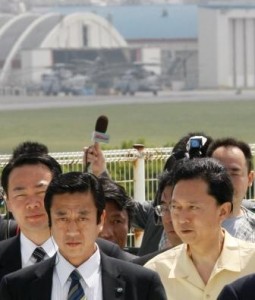Prime Minister Hatoyama’s Pursuit of Equity
More on:

There is an abundance of criticism of Prime Minister Yukio Hatoyama over his handling of the Futenma issue. There seems to be a lot of smug derision and throwing up of hands these days, and the theatrics in the Japanese Diet are getting more and more intense. Secretary of State Hillary Clinton will be stopping in Tokyo on the 21st of this month, and will undoubtedly witness an intensifying political fray in the parliament as government critics amp up their pre-Upper House electoral campaign.
But Secretary Clinton should take a step back from the intensity of this moment, and the frustrations that attend the bilateral effort to figure out a way forward on Okinawa. The Prime Minister seems to be going at things back to front, but the underlying effort at finding equity in a situation that has long been inequitable ought to be better understood. This is not just a policy debate, it is an issue that reaches deeply into the core understandings over who has benefitted and who has not in Japan’s postwar social compact.
Throughout the recent hullaballoo over new “options” the Japanese media has relentlessly focused on Hatoyama and his inexperienced Kantei team. Japan’s bureaucrats who have worked this issue for decades are frustrated, as are ours.
Even the Japanese public is distressed. The DPJ came into office arguing for greater transparency and accountability, but on this issue those tasked with political management have been deeply disappointed. The Cabinet Secretary as well as the Prime Minister seem to shift gears without discernible reason, seeming disingenuous rather than purposeful, and frustrating other members of the Cabinet.
But when it comes to Okinawa, it is not Prime Minister Hatoyama’s goals that are in question. He wants to disperse the operations carried out by U.S. forces in and around Okinawa, reduce the impact of noisy helicopters and fighter jets on the Okinawan people, and finally address one of the core vulnerabilities of the U.S.-Japan alliance–the concentration of U.S. military forces in one economically weak region of Japan. His government has worked up some new options–different options from the LDP government before his–that will at least partially address Okinawa’s complaints.
What bothers most observers arethe Prime Minister’s methods. He seems to have antagonized just about everyone involved. Visitor after visitor has left the PM’s office disgruntled, and this includes a wide array of reputed specialists on the Okinawa base issue, and more publicly, the local political leaders of prefectures and townships that seem to be on his list of possible relocation sites for the U.S. Marine helicopters parked at Futenma. Everyone seems to be saying “no, thanks” to the idea of helping the Prime Minister find options beyond the tiny island prefecture that currently hosts 75% - yes, 75% - of the 45,000 or so U.S. military personnel in Japan.
Last Thursday morning, however, the Prime Minister finally had a visitor who left his office saying “yes” to his request for help. Wataru Aso, Governor of Fukuoka Prefecture and current head of the Japan National Governor’s Association, agreed to call a special meeting of Japan’s governors to discuss the need for mainland cooperation in hosting more U.S. forces. On May 27th, Japan’s governors will gather to talk to Prime Minister Hatoyama, and I expect he will ask those who have Self Defense Force bases in their regions to consider offering up the option of training and temporary co-location to U.S. forces based in Okinawa.
Some governor’s have already spoken out. The conservative governor of Tokyo, Shintaro Ishihara, has dismissed the idea as “nonsense.” But the governor of Osaka, Toru Hashimoto, suggested to his fellow governors in the Kansai region that they ought to step up to this national challenge.
The National Governor’s Association is not likely to produce a plan – but will introduce a conversation that really ought to have taken place decades ago.
If Prime Minister Hatoyama is really leading his country to this conversation, then he has my strong endorsement. The key nut to crack at the moment is not how far Marine Corps helicopters should be asked to fly – although I am hoping they can be as flexible in this discussion as they can be in conducting military operations – but whether or not the Japanese people have enough invested in their security relationship with the U.S. to find a solution that does not depend on the long suffering and disadvantaged Okinawans.
This is a question of equity – pure and simple. And if no one in Japan is willing to host the U.S. Marine Corps or U.S. Air Force aircraft, then we will know that we have a deeper challenge to our alliance cooperation than one individual Prime Minister, and a new inexperienced government.
More on:
 Online Store
Online Store